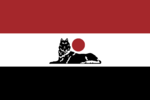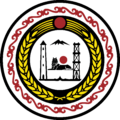Hondonia
The Republic of Qazhshava K'azhsharuliisde Respublika | |
|---|---|
| 'Motto: 'Betsæ meghæ Sæw | |
| Anthem: "Marshde Dæshts'awisde Mæt'aru" march of the raining mountains | |
| Capital | Karakach |
| Largest city | Idlant'a |
| Official languages | Qazhshavan/Lakkathan |
| Recognised regional languages | All Lakkathan Languages, Mehrani-qash, Arabic, Xewexetan |
| Demonym(s) | Qazhshavan Qash |
| Government | Unitary Presidential Republic (de jure) |
• Yuvigh (ruler) | Kaid Ghalvayushvi |
| Area | |
• Total | 992,650 km2 (383,260 sq mi) |
| Population | |
• 2020 estimate | 42,909,690 |
• 2019 census | 42,390,415 |
| GDP (nominal) | 2019 estimate |
• Total | 720.64 bn $ACU |
• Per capita | 17 000 $ACU |
| HDI (2019) | 0.759 high |
| Currency | Ghosh ꞡ (QSG) |
| Time zone | UTC-2 (UTC) |
| Date format | DD/MM/YYYY |
| Driving side | right |
| Internet TLD | .qs |
The Republic of Qazhshava (Qash/Lakkathan: K'azhsharuliisde Respublika ; IPA: /k'aʒ̊:aɾuli:sdɛ ɾɛspublika/) is a country in the Anterian continent of Thrismari, it borders the Marmar sea to the east, the countries of ![]() Mehrava to the west,
Mehrava to the west, ![]() Encessia to the south,
Encessia to the south, ![]() Gassasinia to the south-east, and the United Faerie Peoples to the north.
Qazhshava is in the MTCO (Midwestern Thrismari Cooperation Organization) linking
Gassasinia to the south-east, and the United Faerie Peoples to the north.
Qazhshava is in the MTCO (Midwestern Thrismari Cooperation Organization) linking ![]() Gassasinia with
Gassasinia with ![]() Mehrava and the rest of the MTCO.
Mehrava and the rest of the MTCO.
The Capital, Karakach, is the second largest city in the country, after Idlant'a, it borders the biggest lake in the county, lake Lakot (Qash/Lakkathan: Tebza Lakot ), from which the two great rivers form, the rivers go through the entire country and all the way to ![]() Gorabo thorugh
Gorabo thorugh ![]() Mehrava.
Mehrava.
Ethymology
The name Qazhshava comes from the word 'Qash' which comes from Ardugüd Qazh sha, who was the leader of the Qazhshavans when they migrated into the Ghodab desert (Qash/Lakkathan: Ghodabis Makod ) around the year 1160, the Mehrani people who he ruled over took the name Qazhshans, and the land he ruled became Qazhshava - mehrani for the land of Qazhshans
National Symbols
Animals
the Balck Wolf (Qash/Lakkathan: Shwæts'æn Vuwh ) is the National Mammal of Qazhshava, the symbolism originates with teh Lakkalic people, who see the black wolf as a great and sacred creature, and the embodimate of the god Warida, who is teh highest diety of the lakkalic beliefs, even tho most Lakkalic people worship Islam or Christianity, major Lakkalic believes still remain, such as it is seen that if a black a wolf is killed, the person who killed it would be cursed with bad luck for the rest of their live.
the Golden Eagle (Qash/Lakkathan: Dzemæn Bærek) is the Natoinal Bird of Qazhshava, it is both a Mehrani-Qash and Lakkalic Symbol, symbolizing a lot of diferent things, most overlaping wiht both cultures.
Other Symbols
the Sun (Qash/Lakkathan: Kyazghe), it is both a Mehrani-Qash, Lakkalic and Xewexetan symbol, associated with various indegenous deities and others.
Politics
President Ghalvayu
Administrative divisions
Qazhshava proper
Lakkatha
Zalistan
Aps'ana
Foreign relations
| Country/Union/Autonomous District | Status | State of relations | Mutual Embassies | Visa Requirement | Formal Relations Began | Qazhshavan Ambassador | Foreign Ambassador |
|---|---|---|---|---|---|---|---|
| Positive | Neighboring Nations, both in the Midwestern Thrismari Cooperation Organization. | Karakach/Jabiyah | No | 1949 | Boaris Gamnanddze | Pierre Ghorayeb | |
| Very Positive | Neighboring Nations, both in the Midwestern Thrismari Cooperation Organization, and big historical ties. | Karakach/Azhtanan | No | 1987 | Mililyude Koarlar | Razdân Razâqand | |
| Positive | Neighboring Nations, Big history, Lakkalic minorities in Encessia. | Karakach/Lonue | On arival | Batbayan Atiwadze | |||
| Positive | Both are in the Midwestern Thrismari Cooperation Organization. | Karakach/Al-Zohrah | No | 1920 | Ian Mohameddze | Hakim Saidi | |
| Positive | Both are in the Midwestern Thrismari Cooperation Organization. | Karakach/New Odessa | No | Bedis Makoddze | |||
| Slightly Positive | Both are in the Midwestern Thrismari Cooperation Organization. | Karakach/Syropolis | No | Ali Tebzadze |
Military
As of 2020, Qazhshava has an amry of 360 000 active-duty personel and 740 000 reserved on stand-by who can be deployed when needed. Equiped with 3 940 tanks (many of which are old models), 2 490 Infantry Fighting Vehicles, 6 220 Armored Personel Carriers, 1200 MRAPs (whit 50 more pre-ordered from ![]() Ateenia by 2021), x Artillery, 2 940 Air Defence Vehicles, along with 1 045 Combat Aircraft (including Helicopters), and a 107 strong navy (excluding river flotilla). The Qazhshavan Army is well-equiped and well-trained. Military spending of Qazhshava is about 3.9% of the GDP with a budget of 56,2 billion ghoshes (28,1 billion $ACU).
Ateenia by 2021), x Artillery, 2 940 Air Defence Vehicles, along with 1 045 Combat Aircraft (including Helicopters), and a 107 strong navy (excluding river flotilla). The Qazhshavan Army is well-equiped and well-trained. Military spending of Qazhshava is about 3.9% of the GDP with a budget of 56,2 billion ghoshes (28,1 billion $ACU).
The Qazhshavan Army is mostly active in the Zalistan and parts of the Aps'ana regions. A force is awlays kept ready for deploiment if needed .
Police
Demoghraphics
Demographic chart of Lakkatha (2018)
The mojority population of Qazhshava are Lakkathans, mainly living in and around the south, there are still a lot of acutal Mehrani Qash decended people, who are mainly populated throughoout the Ghodab desert, large concentration in the central ![]() Mehrava border, and throughout the desert itself, with the biggest concentrations being around the big cities and the capital Karakach.
Mehrava border, and throughout the desert itself, with the biggest concentrations being around the big cities and the capital Karakach.
The Lakkathans, who are the current majority in Qazhshava, are also the majority Lakkalic people, they are located mainly in the southern Mountains (majorities in ![]() Mehrava and
Mehrava and ![]() Encessia too), the capital of Lakkatha (a lakkathan authonomous region) is Idlant'a (the largest city in Qazhshava).
Encessia too), the capital of Lakkatha (a lakkathan authonomous region) is Idlant'a (the largest city in Qazhshava).
The Zali people are located thoughout the northwestern mountains (a large minority in ![]() Mehrava too). The Zal are a Lakkalic people who are related to the Lakkathans, and more closely the Aps'an, the Capital of Zalistan (an authonomous Zali region) in Ch'azan.
Mehrava too). The Zal are a Lakkalic people who are related to the Lakkathans, and more closely the Aps'an, the Capital of Zalistan (an authonomous Zali region) in Ch'azan.
The Aps'an are a lakkalic group living in the norhteastern mountains and coast, the Capital of Aps'ana (an authonomous Aps'an region) is Anrav.
The others cathegory is mainly Arabs from ![]() Gassasinia, Encessians and Mehranies, but it also has other Lakkalic people, like the Lavynne, Enlak, Kuch'kana, Lian, Holan, sofokli, Rish, Gudba, Nanuk, Lanshan, Didza, Miyn, and Meyv, who are generally live in small concentrated communities in the moutnains.
Gassasinia, Encessians and Mehranies, but it also has other Lakkalic people, like the Lavynne, Enlak, Kuch'kana, Lian, Holan, sofokli, Rish, Gudba, Nanuk, Lanshan, Didza, Miyn, and Meyv, who are generally live in small concentrated communities in the moutnains.
The Other Minority are the pre-Lakkallic pre-Qash Xewexetan people, who are the oldest people living in Qazhshava, they are located in the hills and fields neer lake Lakot.
| Group | Name |
|---|---|
| Lakkathan | Lakkatha, Enlak, Kuch'kana, Gudba, Sofokli, Miyn, Meyv |
| Zaloaps'an | Zal, Aps'an, Lavynne, Lian, Nanuk, Didza |
| Rish | Rish, Holan, Lanshan |
Geoghrapy
Culture
Language
The official language of Qazhshava is the Lakkathan (sumtimes internationally refered to as Qazhshavan) language, which is the most spoken language of the Lakkalic language-gorup.
Only a minority of Qazhshavans are christians but have the God's prayer in Lakkathan:
| English language | Lakkathan language |
|---|---|
| Our Father in heaven, | Ashve Deda ənə Teyede, |
| hallowed be your name. | k'ə k'avi omindek'e kfede shi, |
| Your kingdom come. | Matfeurulde shi doshəv, |
| Your will be done, | antsi shi k'avi nadzək'e, |
| on earth as it is in heaven. | tsə Demast'ade ra er ənə Teyede. |
| Give us this day our daily bread | Nts'es shve ewa shaym ashve shaymən parihar |
| and forgive us our debts, | di map'ala shve ashve dəwghebi, |
| as we also have forgiven our debtors. | ra seve ghar mp'alek'e tsə dəwghinebi shve. |
| And do not bring us into temptation, | Di arə shve chvara ənə ədzdunet', |
| but rescue us from the evil one. | ma sashame shve də boghadzənde. |
Lakkalic
Lakkathan
Zaloaps'an
Rish
Qazhshavan
Xewexetan
Examples of Xewexetan Music:
Song of the Bison
Song of the horse
Sonf of the Spring

